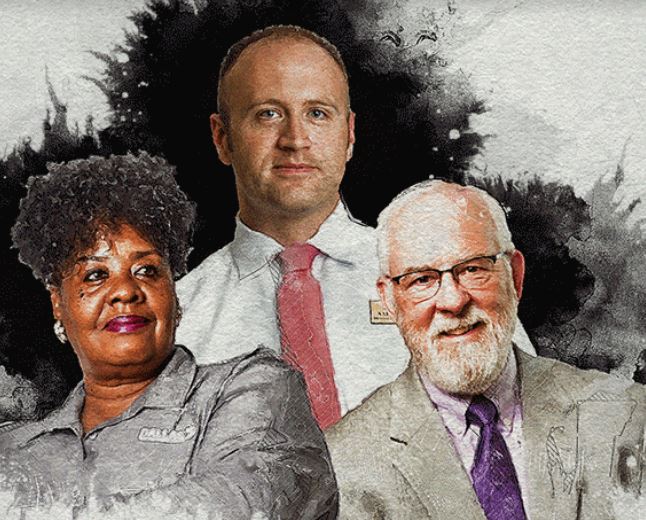 The winners of this year's Excellence in Workers' Compensation Awards will be celebrated during the Workers' Compensation Institute's annual Educational Conference (WCEC), set for Aug. 19-22 at the Orlando World Center Marriott in Florida. (Shutterstock)
The winners of this year's Excellence in Workers' Compensation Awards will be celebrated during the Workers' Compensation Institute's annual Educational Conference (WCEC), set for Aug. 19-22 at the Orlando World Center Marriott in Florida. (Shutterstock)
Editor's Note: The three winners of National Underwriter's Excellence in Workers' Compensation Risk Management Award share key traits that make them champions: company-wide, employee-centric safety programs that yield savings in medical costs and drive down the number of incidents; collaborative personal relationships with the organization's TPA and medical providers; thoughtfully executed return-to-work programs that get injured workers back in action as soon as possible; and most of all, sincere devotion to the well-being of their employees.
They also have some terrific stories to tell, and there are many valuable insights to be gleaned from their award-winning best practices.
This year's winners are the Dallas Independent School District, Cosentino's Food Stores and International Paper, all of which will be celebrated during the Workers' Compensation Institute's annual Educational Conference (WCEC), set for Aug. 19-22 at the Orlando World Center Marriott in Florida. The award statuettes will be bestowed during the conference's general session, which begins at 9 a.m. on Aug. 20.
The 2018 award is co-sponsored by Sedgwick and Safety National. Those attending WCI's conference can meet our winners and have the chance to hear all about the finer points of their programs on Aug. 21 during "Winning Strategies for Workers' Compensation Risk Management," a panel discussion moderated by NU Editor-in-Chief Shawn Moynihan from 9:45 to 11 a.m. in Grand Ballroom 8A, as part of the National Trends in Workers' Compensation track.
 This year's winners are (from left to right) the Dallas Independent School District, which is represented by Tawana Kennedy; Cosentino's Food Stores, which is represented by Aaron J. Greer; and International Paper, which is represented by Bill Wainscott. The winners were celebrated during the Workers' Compensation Institute's annual Educational Conference (WCEC), set for Aug. 19-22 at the Orlando World Center Marriott in Florida. (ALM Media)
This year's winners are (from left to right) the Dallas Independent School District, which is represented by Tawana Kennedy; Cosentino's Food Stores, which is represented by Aaron J. Greer; and International Paper, which is represented by Bill Wainscott. The winners were celebrated during the Workers' Compensation Institute's annual Educational Conference (WCEC), set for Aug. 19-22 at the Orlando World Center Marriott in Florida. (ALM Media)What follows is the first of our three winner profiles.
New school
Each back-to-school season, teachers often thrive from the excitement of setting up classrooms and greeting a fresh batch of students.
That is, until one of those teachers topples from a table while trying to hang maps, mobiles and other go-to learning materials.
Such common school building and school district employee injuries — including slips, trips, strikes, strains, kitchen burns, and transportation and parking lot mishaps — once cost the Dallas Independent School District (Dallas ISD) several million dollars a year. Then Tawana Kennedy, who is now the District's workers' compensation manager, and her team began looking strategically at how to improve service to employees and students while concurrently curbing losses.
Dallas ISD includes nearly 157,000 students housed in 234 schools and more than 34,000 employees.
"When we do anything in this District," Kennedy says, "it's all related to the students."
For the worker's comp program, maintaining a student-centric culture means "treating teachers like royalty," Kennedy says, and helping injured school staff get back on their feet as efficiently and effectively as possible.
Turn the clock back 15 years, and that task also included wrangling workers' comp costs.
Consider that in 2003, Dallas ISD records indicate its workers' comp program paid out nearly $11.5 million. By 2017, however, the District's work comp gross pay out was just under $1.5 million.
Such impressive gains are among the reasons the Dallas Independent School District is a winner of this year's Excellence in Workers' Compensation Awards.
Related: Here are the top 10 schools for insurance and risk management
Multi-pronged approach
How did Dallas ISD slash its workers' comp losses so dramatically?
"It's constant training and asking 'what can we do for you?'" says Kennedy, who has worked in the workers' comp field since the 1980s. "My mind is constantly thinking, where can we go from here?"
One of Kennedy's first cost-cutting challenges involved examining ways injured employees might save money on medical expenses. She determined that standardized health care for injured employees would go a long way toward achieving that goal, which she observed almost immediately after the District instituted a 504 health plan in March 2009. That enabled Dallas ISD to much more aggressively monitor medical care, and remove doctors and facilities from the workers' comp program that may have provided what she calls "excessive medical treatment."
Evaluating medical costs also involved tweaking the District's prescription services.
Kennedy teamed up with a medical cost containment company "so that we could get a contract prescription management team," she says. "In doing so, we were able to reduce medical costs even more."
Identifying indemnity issues
Next, the Dallas ISD workers' comp team zeroed in on its return-to-work program.
Kennedy's squad established a district-wide goal of getting injured employees back to work in 30 days or fewer. They also worked to establish collaborative relationships among departments within the school district, including custodial services, maintenance, food service and document management. These relationships are now critical when an injured employee may need to be reassigned to light duty.
"We try to get [the injured worker] the best care," Kennedy says. "If that individual is released for limited duties, they are allowed to go back into the schools with assistance. If that person has to be off work, we allow the principal enough time to fill that position with a substitute, so that everything continues to run smoothly for the students."
Getting injured employees back to work more quickly also helped curb costs because "when these people are working, they're keeping their bodies strong," says Kennedy.
Fostering the inter-departmental collaboration now impacts everything within the District's workers' comp program. When developing employee training materials, for instance, the workers' comp team makes a point of checking in with risk managers and safety officers.
"There's no time that we go out and present that Safety and Workers' Comp are not working together," Kennedy says. Kennedy believes that such robust partnerships went a long way toward enabling the Dallas ISD workers' comp program to reach its financial goals. "Together we have implemented programs within the Risk Management department that have allowed us to save millions of dollars by targeting safety first," she adds.
One step begets the next
Collaboration illuminated issues within the workers' comp program that the team has been able to amend.
"At one point in time," Kennedy explains, "we were just responding after the fact" to employee injuries. "When we realized this flaw," she continues, "we began to prepare before accidents occurred, and anticipate what may happen so that we could begin minimizing the risk."
Another key move toward minimizing school-injury risk involved finding and training safety managers for each building and department within the District, and giving awards to schools and departments that managed to remain injury-free.
Today, on-site safety coordinators take on the responsibility of promoting and engendering a culture of safety and raising awareness. Their responsibilities include conducting basic site and playground inspections, ensuring compliance with fire regulations, distributing safety materials, and coordinating safety meetings and training sessions. The safety coordinators are essential to the success of the District's Safety and Loss Control Program, Kennedy says.
Claims boot camp
Aggressive claims management became the final piece of the puzzle for the Dallas ISD workers' compensation program.
The team achieved its goals by working more closely with its third-party administrators. Now, the District and its TPAs participate in a quarterly claims review aimed at increasing claims efficiency and effectiveness.
The discussions usually begin with the adjusters providing the team with an update on their claims. All updates should include (but are not limited to) the timeliness of claims management, reserving, plans of actions and other critical components of claims handling.
"Throughout our discussions, we make sure that the end result is to provide the injured employee with quality care," Kennedy says. "It is our goal to reach out to the injured worker, whether by telephone or get-well card, just to let them know that we care."
'We're here to help'
Kennedy says all these steps come down to being proactive rather than reactive, and that her team constantly strives to be of service and assistance to the buildings and departments throughout a vast governmental organization.
"We don't wait for them to call us," she says. "We go out and check in and, in doing so, help stop a lot of injuries."
For instance, after visiting a school, Kennedy's team regularly reports sidewalk cracks or neglected equipment. They often hear back from school leaders that a call placed to the District's maintenance department about a particular repair need is greeted with unparalleled urgency.
In the end, "It's a lot of work," she says, "but it's worth it."
See also:
Why do injured workers turn to attorneys in workers' compensation cases?

